Arctic Indigenous Scholar Seminar with Helen Aderman
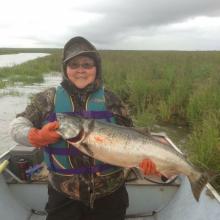
The Arctic Research Consortium of the U.S. (ARCUS) is pleased to host Helen M. Aderman, 2019 Arctic Indigenous Scholar, for a seminar/webinar entitled, “The Bristol Bay Marine Ecosystem & Subsistence Resource Needs”. The event will be held on Monday, 6 May 2019 at 12:00-1:00 p.m. EDT at the US Global Change Research Program (USGCRP) office in Washington, D.C. A live webinar is also available to those unable to attend in person. Registration is required for both the in-person and live-streamed events.
SIPN2 Webinar
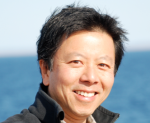
The Sea Ice Prediction Network – Phase 2 (SIPN2) invites registration for an open webinar entitled "ICESat-2 over Sea Ice: Early Results" featuring Ron Kwok, NASA Jet Propulsion Laboratory and the ICESat-2 Team. The presentation will focus on one of NASA’s science objectives for the ICESat-2 altimetry mission—to provide observations to quantify changes and to add to previous satellite and airborne records of freeboard, thickness, and sea surface height of the ice-covered Arctic and Southern Oceans. This event will be held on Tuesday, 7 May 2019 from 10:00 a.m. to 11:00 a.m. AKDT.
Arctic Research Seminar Series with Lawrence Hamilton
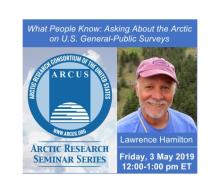
ARCUS invites registration for the next Arctic Research Seminar Series event featuring Lawrence Hamilton (Carsey School of Public Policy, University of New Hampshire). This event, titled “What People Know: Asking About the Arctic on U.S. General-Public Surveys,” will be held on Friday, 3 May 2019 at 12:00-1:00 p.m. EDT in Washington D.C. This seminar will also be available as a webinar live-stream for those unable to attend in person.
Deadlines Extended for Arctic Futures 2050 Conference
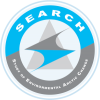
The Arctic Futures 2050 Conference Organizing Committee has announced extended deadlines for the following conference dates:
- Poster Abstracts Deadline: 20 May 2019
- Travel Award Applications Deadline: 20 May 2019
- Poster Decisions and Travel Award Winners Announced: 17 June 2019
- Early-bird Registration Rates End: 10 July 2019
Anchorage Arctic Research Summit

The 2019 Anchorage Arctic Research Summit will be held Thursday, 2 May from 9:00 a.m. to 6:00 p.m. at the Anchorage Museum in Anchorage, Alaska. The conference theme is “Transforming Research and Scholarship in the North” and will bring together members of the Anchorage-area Arctic research community to share information about their diverse research and creative activities, and to foster new connections. Registration is open.
Webinar: Intersection of Arctic Science and Policy
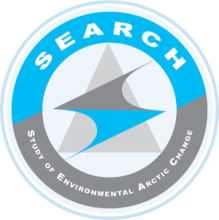
Date and Time: 14 May 2019, 10:00 a.m. AKT/ 2:00 p.m. ET
Location: This event will be held online via Zoom Video Conferencing.
For more information, contact Andrea Fisher, SEARCH Research Associate, afisher13 [at] alaska.edu
The Study of Environmental Arctic Change (SEARCH) invites participation in a virtual discussion, Intersection of Arctic Science and Policy. This web presentation will be held 14 May 2019 at 10:00 a.m. AKT/ 11:00 a.m. PT/ 12:00 p.m. MT/ 1:00 p.m. CT/ 2:00 p.m. ET via Zoom Video Conferencing.
Dr. Brendan Kelly, SEARCH Executive Director, will present a short history of Arctic research policy—from the Arctic Research and Policy Act of 1984 to the Department of Defense Arctic Strategy of 2017—followed by observations on the future science needed to support policy. Input from others on the call is encouraged.
Open to anyone interested in Arctic research and policies. The discussion is part of the lead up to the Arctic Futures 2050 conference that will take place September 4-6, 2019 at the National Academy of Sciences in Washington, D.C. Registration for the conference is now open.
ARCUS Seeking Project Assistant
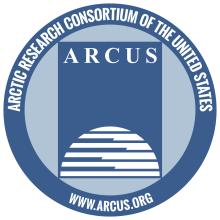
ARCUS is accepting applications for a motivated, organized, and detail-oriented Project Assistant. This position is a non-exempt, full-time position, paid on an hourly basis. Hiring preference will be given to candidates located in Fairbanks. Additional consideration may be given to qualified Alaska-based candidates with demonstrated ability to work from a remote location.
General responsibilities will include travel planning, workshop planning support and implementation, assistance with ARCUS programs, and general administrative support.
Applications will be reviewed beginning Friday, 26 April 2019 and the position will remain open until filled.
IARPC Webinar on the Arctic Futures 2050 Conference

The Permafrost Collaboration Team of the Interagency Arctic Research Policy Committee (IARPC) is organizing a webinar on Monday, April 15 at 2pm EDT to discuss the Arctic Futures 2050 conference and to begin exploring within the permafrost community the knowledge needed to inform decisions concerning the Arctic in coming decades.
To participate, please request an account on the IARPC Collaborations website and the join the IARPC Permafrost Collaboration Team. Once you are signed in, you will be able to view the meeting login details here.
Arctic Futures 2050 Conference Travel Awards
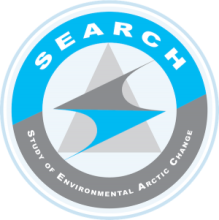
The Arctic Futures 2050 Conference Organizing Committee announces travel award opportunities for early-career researchers and Indigenous knowledge holders. The Arctic Futures 2050 Conference will be an international conference designed to enhance collaboration between Arctic scientists from many disciplines, diverse Indigenous knowledge holders, and policy makers from all levels of government. Travel award applications are due 1 May 2019.
Arctic Futures 2050 Conference Travel Awards

The Arctic Futures 2050 Conference Organizing Committee announces travel award opportunities for early-career researchers and Indigenous knowledge holders. The Arctic Futures 2050 Conference—convened by the Study of Environmental Arctic Change (SEARCH)—will be an international conference designed to enhance collaboration between Arctic scientists from many disciplines, diverse Indigenous knowledge holders, and policy makers from all levels of government. The conference will be held 4-6 September 2019 at the National Academies of Sciences in Washington, D.C. Applications are due 20 May 2019.
Witness Community Highlights

The March 2019 issue of Witness Community Highlights is now available online. This issue includes two articles: “Novel Project Seeks Understanding of Air Pollution Processes in Arctic Conditions,” summarizing efforts to increase understanding of pollution processes relevant to Arctic winter conditions; and “Alaska NSF Program Releases Stakeholder Engagement Report,” summarizing findings of a six-year project entitled “Alaska Adapting to Changing Environments.”
Arctic Research Seminar Series with Elena Sparrow, Marilyn Sigman, Michael Køie Poulsen, and Ted Cheeseman
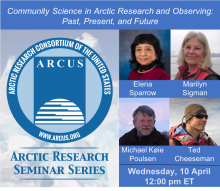
ARCUS invites registration for our next Arctic Research Seminar featuring Elena Sparrow (UAF, Winterberry Project), Marilyn Sigman (Alaska Sea Grant), Michael Køie Poulsen (NORDECO, INTAROS), and Ted Cheeseman (Polar Citizen Science Collective). This seminar, titled “Community Science in Arctic Research and Observing – Past, Present, and Future,” will be held Wednesday, 10 April 2019 from 8:00-9:00am AKDT (12:00-1:00pm EDT) in room 501 of the Akasofu Building (2160 Koyukuk Drive, Fairbanks, Alaska 99775) on the University of Alaska Fairbanks campus. A live webinar is also available to those unable to attend in person.
2019 Sea Ice for Walrus Outlook Begins
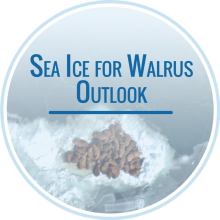
The 2019 Sea Ice for Walrus Outlook season is underway with a record-early start in response to low sea ice conditions in the Bering Sea. Weekly outlooks are published each Friday and include sea ice, weather, and remote sensing information from the National Weather Service and local observations from SIWO observers Bering Strait coastal communities. The Outlook for March 22nd includes an additional contribution from Matthew Druckenmiller and Hajo Eicken, The State of the Ice at Season’s Start.
Dr. Marika Holland Awarded IASC Medal
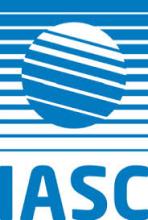
Chair of the SEARCH Science Steering Committee, Dr. Marika Holland, has been awarded this year's IASC Medal for "Outstanding Achievement and Scientific Leadership role in Understanding, Modeling and Predicting the Arctic Climate System, in particular Sea Ice". The Medal will be awarded at the upcoming Arctic Science Summit Week, which will be held in Arkhangelsk, Russia, 22 – 30 May, 2019, where Dr. Holland will deliver a remote lecture.
2018 Sea Ice Outlook Post-Season Report Now Available
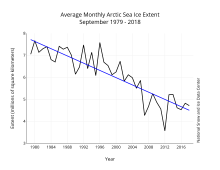
The 2018 Sea Ice Outlook (SIO) Post-Season Report is now available online. This report centers around forecasts of pan-Arctic September minimum sea ice extent, while also including information about forecasts of sea ice probability and a synthesis of observed Arctic conditions from June to September 2018. It also includes a review of forecasts for the Alaskan sector; an evaluation of the SIO forecast skill; discussions about Antarctic maxima sea ice extent forecasts; the Sea Ice Drift Forecast Experiment; an overview of sea ice forecasting needs of the Alaska marine shipping industry; and ideas of how to continue efforts to understand sea ice predictability and how to create information products that are accessible to stakeholders so that the science can be used in decision making to improve outcomes. The SIO is a community network activity led by the Sea Ice Prediction Network-Phase 2 (SIPN2) Project Team with contributions from key partners.
Call for Posters: Arctic Futures 2050 Conference

The Arctic Futures 2050 Conference Organizing Committee invites abstracts for posters; poster sessions will be held during each day of the conference as an integral part of the agenda and expansion of the plenary sessions. Poster abstracts are due 1 May 2019.
Call for Posters: Arctic Futures 2050 Conference
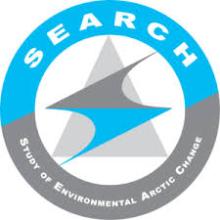
The Arctic Futures 2050 Conference—convened by the Study of Environmental Arctic Change (SEARCH)—will be an international conference designed to enhance collaboration between Arctic scientists from many disciplines, diverse Indigenous knowledge holders, and policy makers from all levels of government. The conference will be held 4-6 September 2019 in Washington, D.C. The Organizing Committee invites abstracts for posters; poster sessions will be held during each day of the conference as an integral part of the agenda and expansion of the plenary sessions. Poster abstracts are due 20 May 2019.
Arctic Research Seminar Series with Donna Hauser
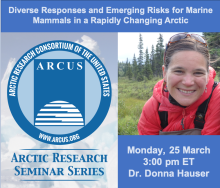
ARCUS invites registration for our next Arctic Research Seminar featuring Donna Hauser (International Arctic Research Center, University of Alaska Fairbanks). This seminar, titled “Diverse Responses and Emerging Risks for Marine Mammals in a Rapidly Changing Arctic,” will be held Monday, 25 March 2019 from 11:00am-12:00pm AKDT in room 501 of the Akasofu Building (2160 Koyukuk Drive, Fairbanks, Alaska 99775) on the University of Alaska Fairbanks campus. A live webinar is also available to those unable to attend in person.
The Expanding Footprint of Rapid Arctic Change
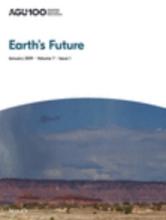
In an Earth’s Future commentary, a broad array of natural and social scientists describe the consequences of a rapidly warming Arctic on sea level, coastal erosion, extreme weather, and infrastructure. Twila Moon (National Snow and Ice Data Center) and her co-authors point out the impacts on economies and cultures in the Arctic and beyond. “This important paper vividly illustrates the power of multi-disciplinary synthesis presented in clear language,” said SEARCH Executive Director, Brendan Kelly.
Witness Community Highlights

The February issue of Witness Community Highlights is now available online. This issue includes two articles: “2018 Arctic Observing Summit News,” summarizing recent efforts to develop a draft scope of work that addresses Sustaining Arctic Observing Network objectives; and “Revised Principles for Conducting Research in the Arctic: 21st Century Guidelines to Ethical Research,” summarizing guidelines for researchers to engage with people and conduct research in the Arctic.
2018 SIO Post-Season Report - Review Draft Available
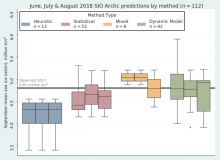
The Sea Ice Prediction Network (SIPN2) Project Team invites sea ice experts and members of the SIPN network to provide comments on the preliminary draft of the 2018 Sea Ice Outlook (SIO) full post-season report. This draft report, a product of the SIPN2 Project Team led by Uma Bhatt, includes the main post-season analysis and discussion points. A PDF of the draft report is available online as well as instructions on how to submit comments.
AOS Working Group on Arctic Observing Optimization & Implementation Seeks Input
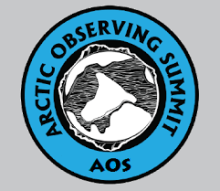
The Arctic Observing Summit (AOS) working group on Optimization and Implementation is inviting community input and participation in a new task team working to develop a roadmap for future Arctic observational capacities. Learn more about the working group's current activities in this report out from their December open meeting.
ARCUS at the Alaska Forum on the Environment
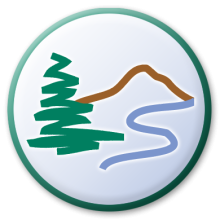
ARCUS staff are attending the Alaska Forum on the Environment this week (Feb. 11-15) in Anchorage, Alaska and have an exhibition booth on the 2nd floor, outside of Meeting Room #3. If you are attending the meeting, stop by and say hi!
ARTIC FUTURES 2050 CONFERENCE

In 2019, SEARCH and partners will convene Arctic scientists from all disciplines, indigenous knowledge holders, and decision makers to share current understanding and identify future directions for research needed to inform Arctic policy. The conference also is intended to foster more effective and iterative collaborations among Arctic scientists and decision makers.
DATES: 4-6 September 2019
VENUE: National Academy of Sciences,
2101 Constitution Avenue, NW
Washington, DC
Watch for updates at https://www.searcharcticscience.org/arctic-2050
For more information, contact:
Brendan P. Kelly
Executive Director
Study of Environmental Arctic Change
bpkelly [at] alaska.edu
[video: ]
SEARCH contributes to a new paper exploring links between Greenland ice melt and build infrastructure
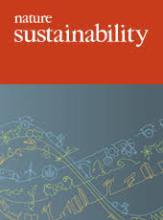
In a paper published on 11 February 2019, Mette Bendixen, Irina Overeem, and their colleagues advocate that Greenland¹s melting ice sheet provides a tremendous source of water and sediment transported to the coast (Bendixen et al. 2019). At the coast, sediments settle out and build out deltas accumulating huge volumes of sand. Previously, the authors showed how massive these fluxes of sediment are, about 9% of the world¹s river sediment is produced in Greenland (Bendixen et al. 2017, Overeem et al. 2017). They project sediment pile-up will only get larger with continuing climate change and ice sheet melt. At the same time, sand is increasingly valued as a scarce resource worldwide. Demand for sand has grown exponentially over the last century it is a key component of urbanization, infrastructure expansion and coastal protection. Bendixen and her coauthors present an analysis that explores whether Greenland as a society can sustainably mine sand and how sand mining could contribute to Greenland¹s economy and independence.
"It is as if these researchers presaged Navigating the New Arctic, one of NSF's 10 Big Ideas," commented Brendan Kelly, SEARCH Executive Director. "Before Navigating the New Arctic was established, Bendixen and coauthors already were investigating connections between the climate change, ice melt, and business opportunities."
Bendixen, M., Overeem, I., Rosing, M. T., Bjørk, A. A., Kjær, K. H., Kroon, A., Zeitz, G., and Iversen, L. L. (2019). Promises and perils of sand exploitation in Greenland. Nature Sustainability, 2(2), 98–104. https://doi.org/10.1038/s41893-018-0218-6
Bendixen, M., Lonsman-Iversen, L., Bjork, A., Elberling, B., Westergaard-Nielsen, A., Overeem, I., Barnhart, K, Khan, S., Box, J., Abermann, J., Langley, K., Kroon, A., 2017. Delta Progradation in Greenland driven by glacial mass loss. Nature 55, 101104.
Overeem, I., Hudson, B., Syvitski, J., Mikkelsen A., Hasholt, B., van der Broeke, M., Noel, B., Morlighem, M., 2017. Substantial export of suspended sediment to the global oceans from glacial erosion in Greenland. Nature Geoscience 10, 85986
